The convergence of artificial intelligence (AI) and biotechnology is no longer a future vision — it’s transforming the field today. From accelerating drug discovery and genome sequencing to enabling precision medicine and predicting future disease risks, AI is redefining what’s possible in biotech.
With its ability to process vast, complex biological data faster and more accurately than any human, AI is dramatically shortening development cycles and unlocking breakthroughs that were once years away.
According to recent market research, the global AI in biotechnology market was valued at US$2.73 billion in 2023, growing at a CAGR of 19.1% from 2024 to 2029. By the end of this period, it is expected to surpass US$7.75 billion, a clear signal that AI in biotech is not just hype but a strategic game-changer.
In this article, we’ll explore how AI is reshaping the biotech industry, from its most promising applications and tools to the top startups driving innovation, and what the future holds for this powerful alliance.
Challenges Of the Conventional Biotech Industry
Conventional biotechnology suffers from inefficiency and high risk. It typically takes more than a decade to get a single new treatment from concept to market and involves billions of dollars in research, clinical trials, and production. The fact is that most candidates fail; historically, only around ~14% of drug programs succeed through clinical trials. That long, uncertain timeline has all sorts of obstacles:
- Long R&D Horizon: It typically takes 10 years or more to move a biotech project from molecule design to FDA Approval. Prolonged experiments and phased trials equal slow progress.
- High cost and risk: As 86% of such firms fail, huge capital must be invested with no guarantee of return (Precedence Research). Every failed trial or spoiled experiment simply adds to the cost.
- Data Overload but Little Insight: Modern biotech produces petabytes of data (genomic sequences, imaging, high-throughput assays), but our tools are still inadequate to analyze it in full. A lot of data just sits, unused by organizations, or needs time-consuming manual analysis.
- Regulatory Compliance: Even the most well-planned project can be held up by red tape, such as stringent regulations and evolving standards. New therapies (such as gene-edited products) confront unclear paths to approval, so companies often invest additional time in making everything compliant.
Role Of AI In Biotech
AI is a disruptive force in how biotech problems are addressed, with data-driven insights and automation across the pipeline. In the fields of drug discovery, genomics, and synthetic biology, AI systems could be better than humans at recognizing patterns and coming up with solutions that humans, unaided, would never find. For example, one recent roundup notes that “AI tools are transforming bioengineering workflows and unlocking breakthroughs in medicine, agriculture, and sustainability.” In practice, AI is used for:
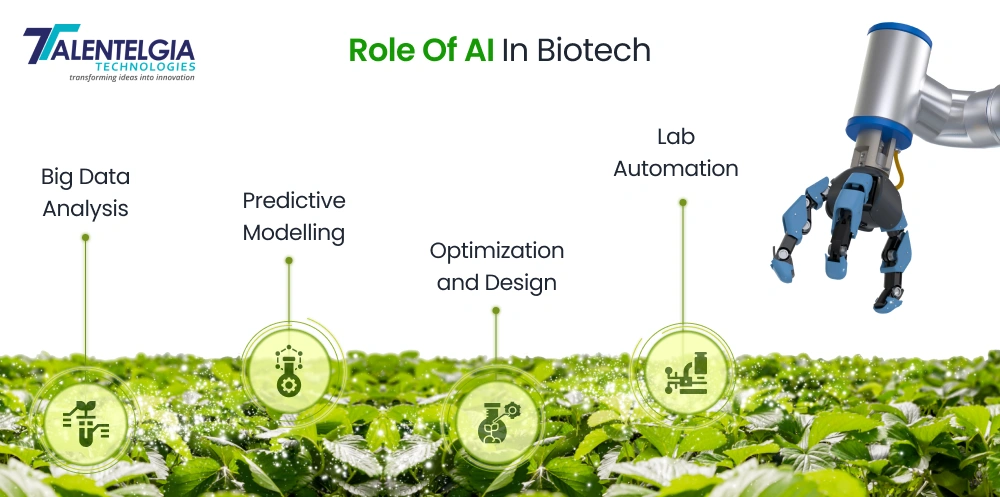
- Big Data Analysis: Machine learning algorithms interrogate genomics, proteomics, and clinical data to find correlations of value. For instance, they examine DNA and protein sequences and try to identify mutations related to disease or potential drug targets. In oncology, tools like IBM’s Watson Genomics analyze a patient’s tumor genetics along with vast medical research to recommend personalized treatments based on specific genomic biomarkers.
- Predictive Modelling: AI predicts complex biological outcomes. The most famous example is DeepMind’s AlphaFold, a deep learning system that can predict the 3D structure of a protein from its amino acid sequence. This tool resolved a 50-year-old “protein folding problem,” which had previously constrained scientists to being able to model the shapes of all but the simplest proteins only by means of slow X-ray or cryo-EM experiments. Models like these are used in drug design because having that sort of information about proteins is critical for targeting diseases.
- Optimization and Design: Generative AI models are being used to design new molecules, enzymes, and genetic constructs. For example, generative platforms can propose small-molecule drug candidates optimized for binding and safety. Insilico Medicine’s Pharma.AI platform uses this approach to generate novel drug candidates (see Use Cases below). In gene editing, AI tools (like DeepCRISPR) design optimal CRISPR guide RNAs to minimize off-target edits. More broadly, generative models (inspired by GPT or others) are being adapted to propose biomolecular sequences that satisfy multiple design criteria.
- Lab Automation: AI coordinates lab automation tools. Companies like Chemspeed (now a part of Bruker), for instance, can create a robotic platform that runs experiments all day and night. These are systems that produce set pieces of high-quality data automatically that feed back into AI analyses. By integrating AI sensors, robots, and analytics in one workflow, AI enables experimentation to run continuously.
Benefits Of AI In Biotech
There are a lot of concrete returns to bringing AI into biotech. With automated analysis and design, AI is poised to increase speed, productivity, and cost efficiency across biotech work streams. Key benefits include:
- Faster R&D: AI-powered tools can reduce the time to develop new products. In another example, an AI-designed drug by Insilico went from creation to human trials in about 30 months — about half as long as it would normally take, and at a fraction of the regular cost. By computationally predicting which molecules are promising, AI helps to spare slow trial-and-error lab work. AI can also minimize sample sizes required for clinical trials, a study found AI algorithms could reduce control arms recruitment by ~35% and years off studies. In short, faster R&D equals more patient lives saved sooner.
- Lower Costs: AI saves money by eliminating a lot of failed experiments and optimizing processes. In silico screening reduces the number of wet-lab assays. AI-managed production means fewer wasted materials and energy. Novartis says AI-based analytics in manufacturing assist in early issue detection, reducing batch failures. Lower-cost R&D pipelines can justify working on more complex or rare diseases.
- Enhanced Success Rates: The predictive nature of AI improves your chances of success. For example, companies can use machine learning to analyze data from past trials and develop smarter trial protocols that focus on the right groups of patients. Better modeled proteins (using AlphaFold) help us pick better drug targets and reduce wasted targets. And, yeah, when it comes to gene editing, AI-designed CRISPR guides mean fewer off-target effects, which will then lead to a higher editing efficacy. These advances taken together can potentially reverse the typical ~86% failure rate of the past.
- Discoveries and innovation: The most exciting contribution that AI can make is not what we already know, but what we don’t know. Things that AI can discover that humans cannot. Already, deep learning models have identified new enzymes and biochemical pathways. For instance, AI-driven analyses of the genomes of microbes have just uncovered dozens of new CRISPR-associated proteins, which could widen the gene-editing “toolkit” for labiotech. eu. AI can also generate entirely new molecular structures (de novo design) that would never show up in a lab screen. These advancements result in classes of new drugs, biofuels, and degradable materials.
- Personalized and Precision Solutions: AI in healthcare offers precision medicine. When you add in genetic, phenotypic, and environmental data, AI models can generate individualized treatments for patients. With oncology centers advertising AI-powered genomic analysis, designed to match cancer patients with targeted therapies that may save their lives, artificial intelligence has ushered in an era of high-tech oncology. And AI can also assist in tuning agricultural biotech: it could, for instance, pick and choose which crop traits to deploy in future climates using the kinds of computers pretending to be predictive biology, or custom-make microbiomes to keep soil healthy. In theory, AI makes biotech solutions more personalized and data-driven.
AI Vs Traditional Biotech
To see how powerful AI is in biotech, it’s useful to compare it with older methods. AI helps speed up research, lower costs, and improve accuracy in things like drug discovery and lab testing.
| Aspect | Traditional Biotech | AI-Enabled Biotech |
|---|---|---|
| R&D Timeline | 10–15 years | 2–4 years (AI-driven) |
| Success Rate | 14% of drug candidates survive | Higher (fewer failures, e.g. rational design) |
| Cost per Drug | $1–2 B (high attrition) | Lower (fewer trials, less lab work) |
| Data Analysis | Manual, siloed, slow | Automated, integrative (ML on big data) |
| Experimentation | Manual assays, slow scale | 24/7 robotic labs, rapid screening |
| Innovation | Incremental, serendipitous | Generative design, novel targets (AlphaFold, etc.) |
Risks Of AI In Biotech
While AI offers great benefits, it also introduces new challenges and risks that we must manage responsibly. Key concerns include:
- Biosecurity and Dual-Use: AI can lower the barrier to engineering new organisms. However, people could also misuse AI technologies to create destructive pathogens or invasive species. A nature review cautions that democratization of DNA design “could open up the possibility for the de novo design of harmful biology” without adequate supervision, But as AI continues to automate more of the design-build-test cycle, even those without this type of deep expertise might, in theory, be able to come up with something dangerous themselves. Such risk can be minimized by requiring robust security protocols and screenings (e.g., for orders of the synthesis of DNA).
- Personal Data: Much of biotech is built on sensitive genetic and health data. And because AI is capable of analyzing DNA, breaches could result in the release of unchangeable personal data. For example, if hackers ever accessed a large set of genome data, they could uncover someone’s genetic weaknesses and misuse them—potentially by employers or insurance companies. Unlike a password, you can’t reset your DNA. Though none of the sources we found quantified that risk, experts caution that genomic privacy is a key issue as AI-powered biotech continues its exponential growth. It needs to be strongly encrypted, anonymized, and inside ethical walls.
- Algorithmic Bias and Fairness: AI systems that use too few or biased data cause biased results. And in health care, biased models may result in treatments that work for some populations but not others. The WHO points out a scenario in which, if AI models are not inclusive, then unequal results might follow. It is critical to guarantee diverse training data and transparent, explainable AI models, or existing health disparities may be compounded.
- Regulatory and Ethical Overhead: AI’s “black box” nature can clash with the need for explainability in medical products. Regulators must adapt to evaluate AI-driven therapies. For instance, how do you validate an AI-designed molecule whose rationale isn’t fully interpretable? Ethical questions also abound (e.g., who is responsible if an AI-designed therapy causes harm?). Robust regulatory frameworks and ethics guidelines for AI in biotech are still emerging and lagging behind the technology. Industry and policymakers must collaborate to ensure safety without stifling innovation
Real World Use Cases Of AI In Biotech
Several leading companies and projects are evidence of the ways that AI is already leaving its mark in biotech. Here are a few examples across drug discovery, genomics, and synthetic biology:
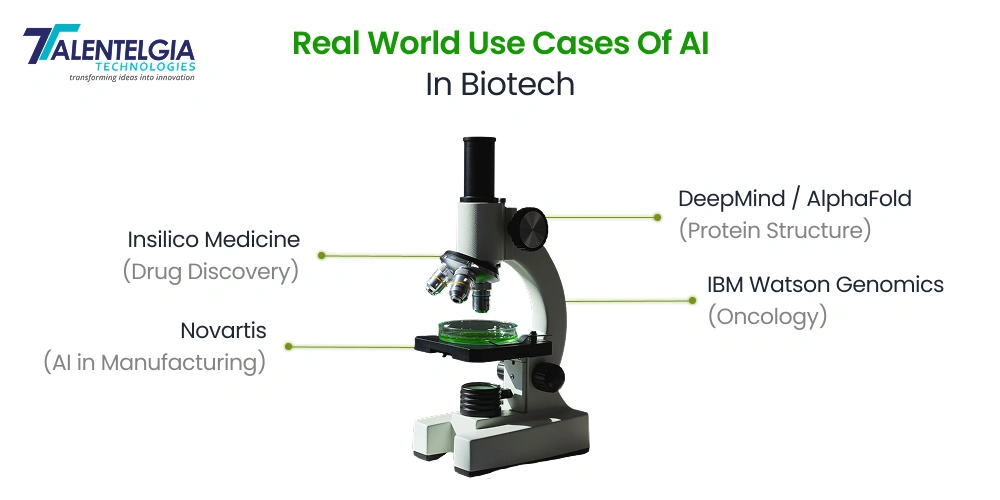
- DeepMind / AlphaFold (Protein Structure): DeepMind’s AlphaFold algorithm has generated models of the 3D structure of most of the proteins in the body in multiple organisms, nearly at the ‘experimental level of accuracy’. For instance, in the recent CASP14, AlphaFold reached a median accuracy of 0.96 Å on protein backbone. These predictions are now in a public database, making headway in fields ranging from enzymology to drug development. By eliminating months of lab work to solve structures, AlphaFold is speeding basic science and allowing researchers to aim at proteins that had been cost-prohibitive to study.
- IBM Watson Genomics (Oncology): IBM’s Watson AI got in on biomedicine early. The genetics company Quest Diagnostics collaborated to build the program, which analyzes tumor DNA sequences for promising targeted cancer therapies. It does so by cross-referencing a patient’s tumor mutations with an extensive database of cancer literature and known drug responses. The trials had found that while Watson Genomics could interpret data from a patient’s genomic profile in minutes, a human doing the same job might need weeks to do so. Though commercial applications are changing, Watson’s effort demonstrated how AI can help clinicians make sense of complex diagnostic tests at the bedside.
- Novartis (AI in Manufacturing): Swiss pharma giant Novartis has introduced AI into its manufacturing lines. Robot-based analytics are monitoring tablet and vial production in real time, for example. These systems capture anomalies (like a bad pill) before they become big problems. Automating QC has delivered waste savings and increased batch quality consistency, according to Novartis. That use case is instructive in showing how AI creates value not just in R&D, but across the biotech lifecycle: from manufacturing, to supply chain, and so on.
- Insilico Medicine (Drug Discovery): Insilico’s Pharma.AI platform uses generative deep learning to design new drug candidates. In mid-2023, Insilico announced that INS018_055, a fibrosis drug entirely discovered and optimized by AI, entered Phase II clinical trials. Remarkably, this program went from target discovery to first human dosing in about 30 months, roughly half the normal development time. and at a fraction of the typical cost. This real-world milestone shows that AI can accelerate drug pipelines dramatically.
Future Trends Of AI In Biotech
As the intersection of artificial intelligence and biotechnology continues to evolve, the next decade holds transformative potential. AI is evolving from a simple tool into a full-fledged co-designer in scientific discovery, driving everything from autonomous lab systems to quantum-powered simulations.
Here are some of the most promising future trends shaping this space:
- Generative Bio-Design: AI makes the transition from prediction into full-scale design of biological systems. Similar to how generative models generate images or text now, models in the future may generate entire genetic circuits or custom proteins “on demand.” Projects such as BioAutomata imagine an automation aura that can run a design-build-test-learn loop relatively autonomously, with optimal interaction with humans. In that future, an AI could suggest a new enzymatic step for making biofuels, have it printed out in a biofab, tested in a mini bioreactor, and feed the results back into the model, in an automatic cycle.”
- Incorporation with Synthetic Biology: AI and synthetic biology are overlapping. Sophisticated AI algorithms will guide them through the vast design space of genetic engineering. Other recent reviews compare future AI systems to “AI biological designers” that consider intricate biological contexts. Picture AI that can forecast how an entire microbial pathway will behave in an industrial fermenter and design it for that. This might spell a revolution for sustainable manufacturing (such as creating chemicals by engineered yeast) and could bring about new solutions for climate or energy.
- Quantum Computing Synergy: As quantum computers mature, they might provide an extra wind in the sails of AI in biotech. Quantum algorithms will be able to simulate even more difficult molecular simulations. One summary of a report imagines applications for AI + quantum computing in tackling issues such as drug resistance and complex pharmacokinetics, solving problems that classical computers have difficulty navigating. In application, this could translate to the precise emulation of whole cells or the optimization of large metabolic networks on a novel time scale.
- More Robust Governance and Cooperation: Because they see the risk, governments and companies will create more effective regulations and ethical codes. International networking (between scientists, ethicists, and policy makers) will be crucial to discuss and resolve dual-use and privacy concerns. New paradigms for “AI-synthetic biology safety” may follow that require AI-designed sequences to cross biosecurity thresholds.
Conclusion
The science of biotechnology is being changed from art to data by artificial intelligence. By taking on huge data sets and automating arduous tasks, AI is helping to break down the classic barriers in biotech R&D. Drugs are being developed in months, not years, proteins are interpreted without time-consuming experiments, and lab robots are now working shifts around the clock. These breakthroughs are leading to more rapid innovation, lower cost, and new therapies that have previously been out of reach.
Yet at the same time, it is a revolution with new responsibilities. Ethical applications of gene editing, the safeguarding of genetic data, and biosecurity precautions will need to keep up with AI capabilities. It will take collaboration between biotech professionals, regulators, and investors to achieve the full promise of AI based on clear guidelines and safe practices.


 Healthcare App Development Services
Healthcare App Development Services
 Real Estate Web Development Services
Real Estate Web Development Services
 E-Commerce App Development Services
E-Commerce App Development Services E-Commerce Web Development Services
E-Commerce Web Development Services Blockchain E-commerce Development Company
Blockchain E-commerce Development Company
 Fintech App Development Services
Fintech App Development Services Fintech Web Development
Fintech Web Development Blockchain Fintech Development Company
Blockchain Fintech Development Company
 E-Learning App Development Services
E-Learning App Development Services
 Restaurant App Development Company
Restaurant App Development Company
 Mobile Game Development Company
Mobile Game Development Company
 Travel App Development Company
Travel App Development Company
 Automotive Web Design
Automotive Web Design
 AI Traffic Management System
AI Traffic Management System
 AI Inventory Management Software
AI Inventory Management Software
 AI Software Development
AI Software Development  AI Development Company
AI Development Company  AI App Development Services
AI App Development Services  ChatGPT integration services
ChatGPT integration services  AI Integration Services
AI Integration Services  Generative AI Development Services
Generative AI Development Services  Natural Language Processing Company
Natural Language Processing Company Machine Learning Development
Machine Learning Development  Machine learning consulting services
Machine learning consulting services  Blockchain Development
Blockchain Development  Blockchain Software Development
Blockchain Software Development  Smart Contract Development Company
Smart Contract Development Company  NFT Marketplace Development Services
NFT Marketplace Development Services  Asset Tokenization Company
Asset Tokenization Company DeFi Wallet Development Company
DeFi Wallet Development Company Mobile App Development
Mobile App Development  IOS App Development
IOS App Development  Android App Development
Android App Development  Cross-Platform App Development
Cross-Platform App Development  Augmented Reality (AR) App Development
Augmented Reality (AR) App Development  Virtual Reality (VR) App Development
Virtual Reality (VR) App Development  Web App Development
Web App Development  SaaS App Development
SaaS App Development Flutter
Flutter  React Native
React Native  Swift (IOS)
Swift (IOS)  Kotlin (Android)
Kotlin (Android)  Mean Stack Development
Mean Stack Development  AngularJS Development
AngularJS Development  MongoDB Development
MongoDB Development  Nodejs Development
Nodejs Development  Database Development
Database Development Ruby on Rails Development
Ruby on Rails Development Expressjs Development
Expressjs Development  Full Stack Development
Full Stack Development  Web Development Services
Web Development Services  Laravel Development
Laravel Development  LAMP Development
LAMP Development  Custom PHP Development
Custom PHP Development  .Net Development
.Net Development  User Experience Design Services
User Experience Design Services  User Interface Design Services
User Interface Design Services  Automated Testing
Automated Testing  Manual Testing
Manual Testing  Digital Marketing Services
Digital Marketing Services 
 Ride-Sharing And Taxi Services
Ride-Sharing And Taxi Services Food Delivery Services
Food Delivery Services Grocery Delivery Services
Grocery Delivery Services Transportation And Logistics
Transportation And Logistics Car Wash App
Car Wash App Home Services App
Home Services App ERP Development Services
ERP Development Services CMS Development Services
CMS Development Services LMS Development
LMS Development CRM Development
CRM Development DevOps Development Services
DevOps Development Services AI Business Solutions
AI Business Solutions AI Cloud Solutions
AI Cloud Solutions AI Chatbot Development
AI Chatbot Development API Development
API Development Blockchain Product Development
Blockchain Product Development Cryptocurrency Wallet Development
Cryptocurrency Wallet Development About Talentelgia
About Talentelgia  Our Team
Our Team  Our Culture
Our Culture 
 Healthcare App Development Services
Healthcare App Development Services Real Estate Web Development Services
Real Estate Web Development Services E-Commerce App Development Services
E-Commerce App Development Services E-Commerce Web Development Services
E-Commerce Web Development Services Blockchain E-commerce
Development Company
Blockchain E-commerce
Development Company Fintech App Development Services
Fintech App Development Services Finance Web Development
Finance Web Development Blockchain Fintech
Development Company
Blockchain Fintech
Development Company E-Learning App Development Services
E-Learning App Development Services Restaurant App Development Company
Restaurant App Development Company Mobile Game Development Company
Mobile Game Development Company Travel App Development Company
Travel App Development Company Automotive Web Design
Automotive Web Design AI Traffic Management System
AI Traffic Management System AI Inventory Management Software
AI Inventory Management Software AI Software Development
AI Software Development AI Development Company
AI Development Company ChatGPT integration services
ChatGPT integration services AI Integration Services
AI Integration Services Machine Learning Development
Machine Learning Development Machine learning consulting services
Machine learning consulting services Blockchain Development
Blockchain Development Blockchain Software Development
Blockchain Software Development Smart contract development company
Smart contract development company NFT marketplace development services
NFT marketplace development services IOS App Development
IOS App Development Android App Development
Android App Development Cross-Platform App Development
Cross-Platform App Development Augmented Reality (AR) App
Development
Augmented Reality (AR) App
Development Virtual Reality (VR) App Development
Virtual Reality (VR) App Development Web App Development
Web App Development Flutter
Flutter React
Native
React
Native Swift
(IOS)
Swift
(IOS) Kotlin (Android)
Kotlin (Android) MEAN Stack Development
MEAN Stack Development AngularJS Development
AngularJS Development MongoDB Development
MongoDB Development Nodejs Development
Nodejs Development Database development services
Database development services Ruby on Rails Development services
Ruby on Rails Development services Expressjs Development
Expressjs Development Full Stack Development
Full Stack Development Web Development Services
Web Development Services Laravel Development
Laravel Development LAMP
Development
LAMP
Development Custom PHP Development
Custom PHP Development User Experience Design Services
User Experience Design Services User Interface Design Services
User Interface Design Services Automated Testing
Automated Testing Manual
Testing
Manual
Testing About Talentelgia
About Talentelgia Our Team
Our Team Our Culture
Our Culture
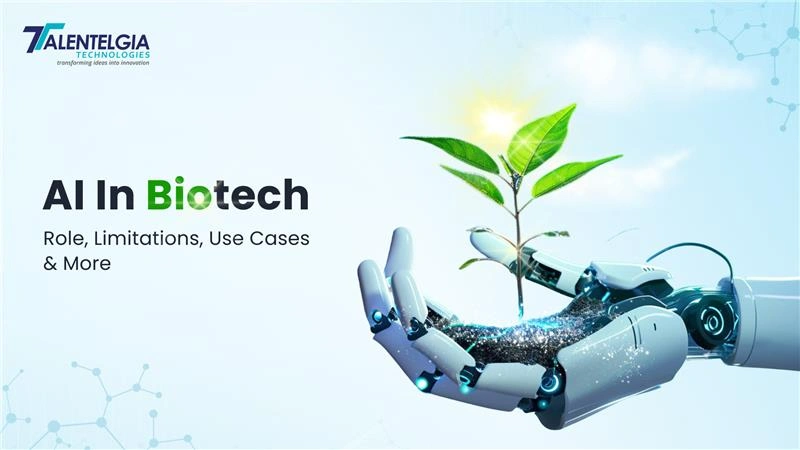
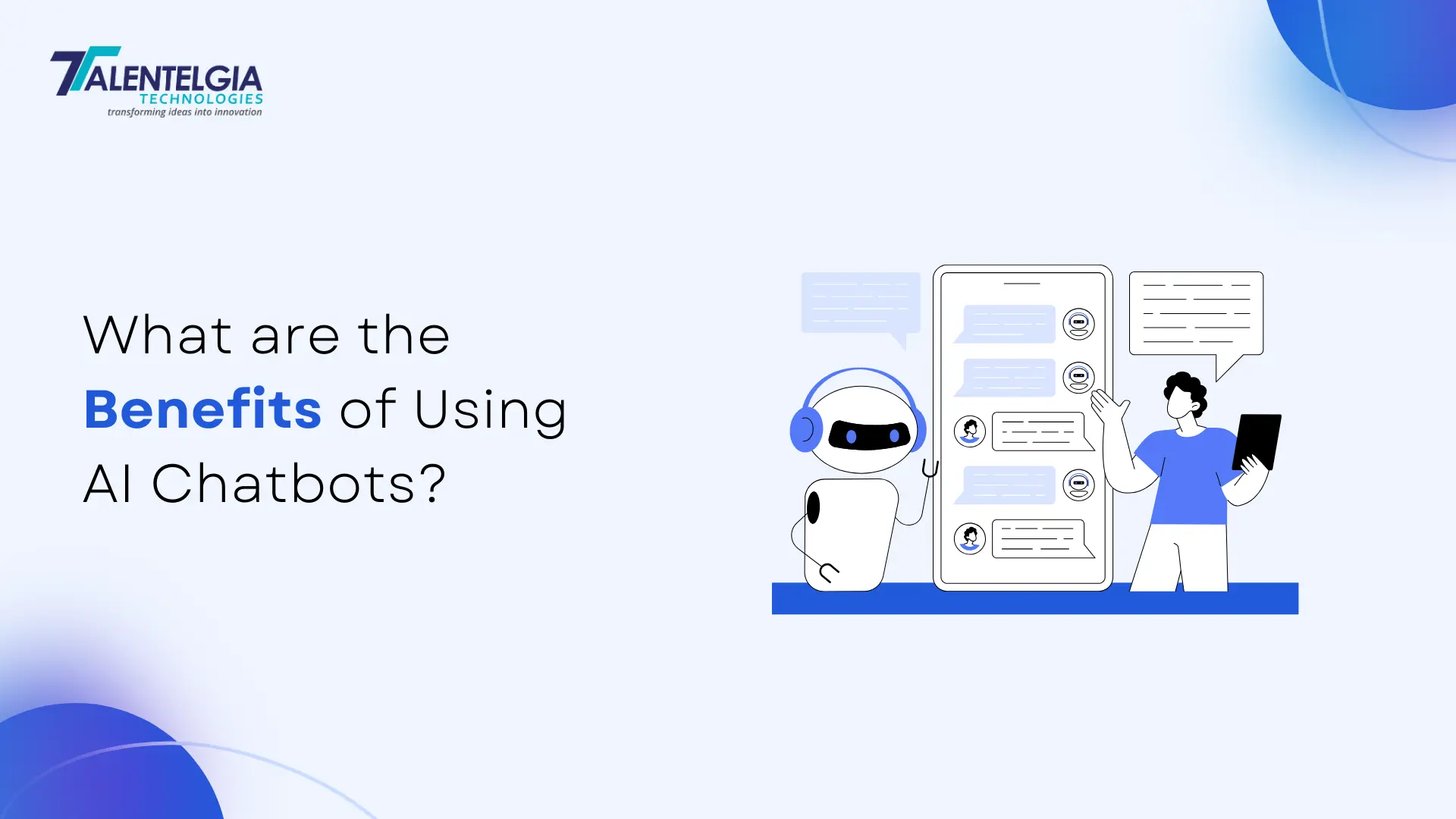

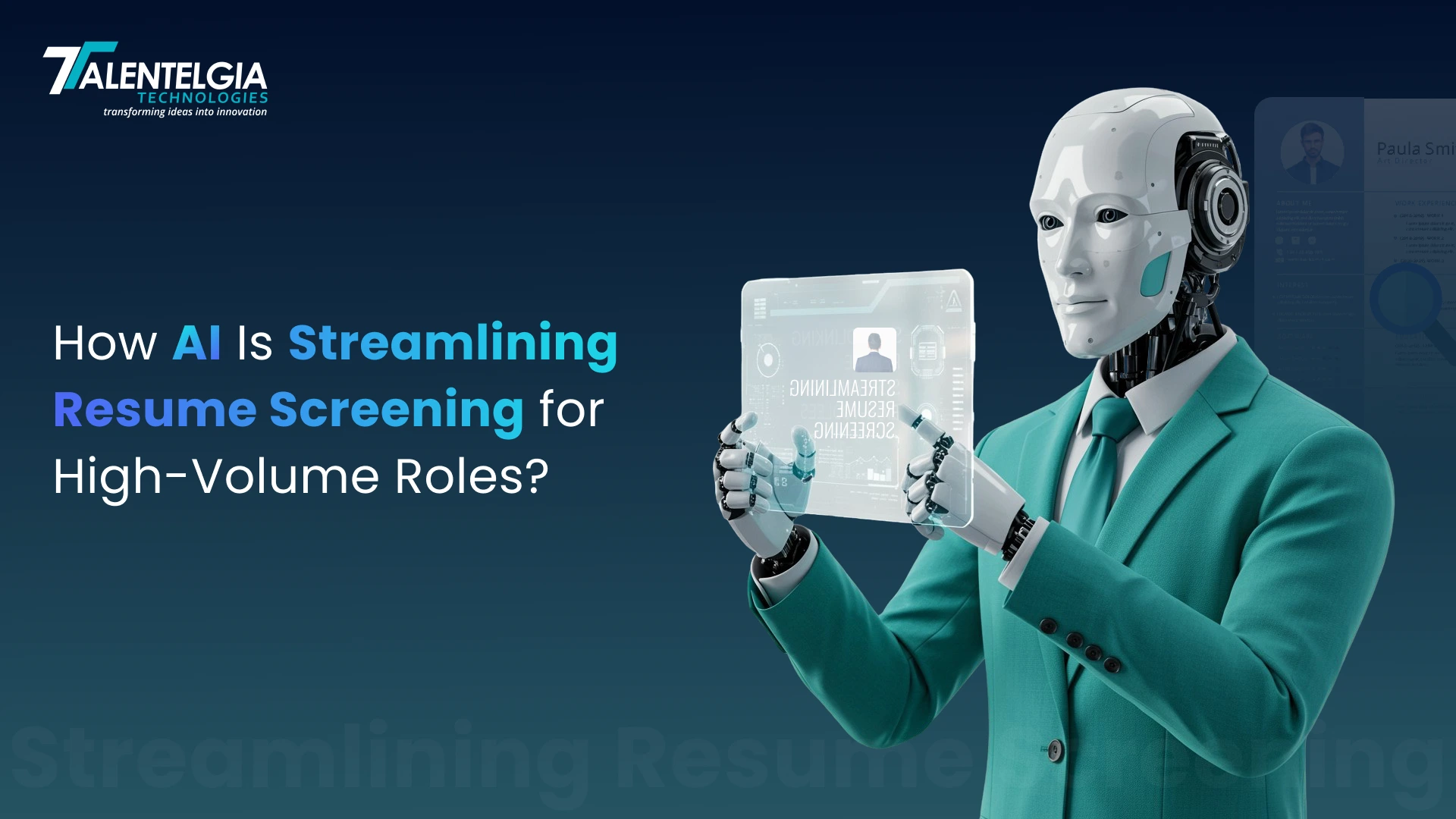

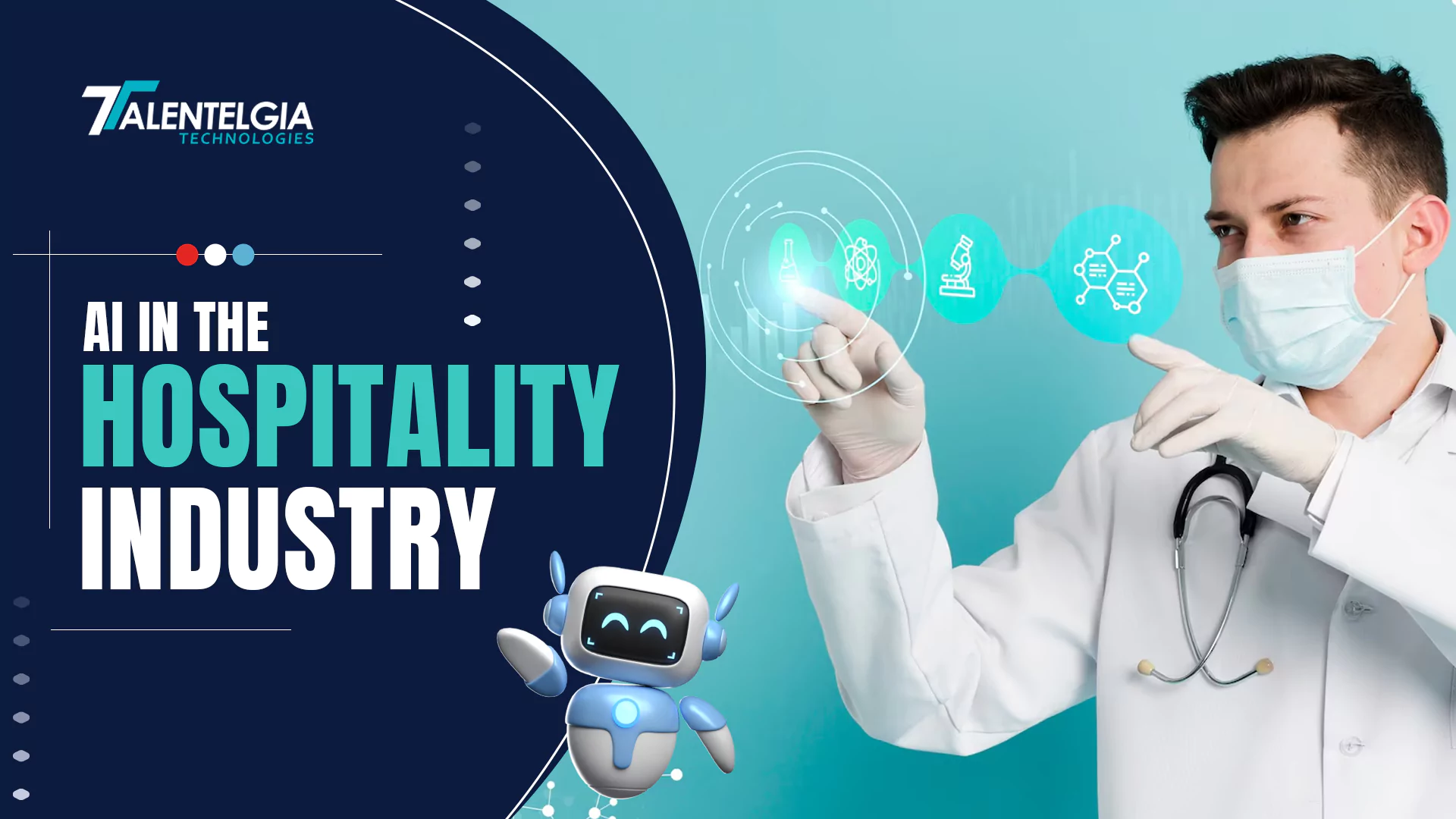











 Write us on:
Write us on:  Business queries:
Business queries:  HR:
HR: 





